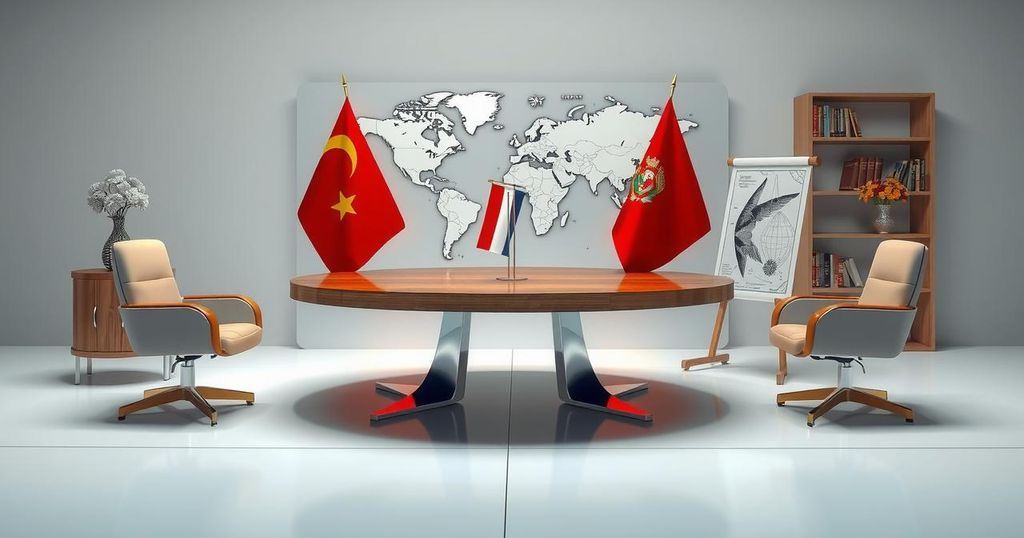Trump’s Concessions to Putin Raise Concerns Ahead of Ukraine Peace Talks
Recent U.S.-Russia talks in Saudi Arabia, led by Trump officials, highlight concerns over possible concessions to Putin that could compromise Ukraine’s interests. Mixed messages regarding the inclusion of Ukraine in peace negotiations have sparked alarm signals among European nations, prompting emergency meetings. As Trump aims for a diplomatic resolution, the geopolitical ramifications of his strategies raise significant challenges for Ukraine and its allies.
As U.S.-Russia talks proceed in Saudi Arabia regarding the Ukraine conflict, Vladimir Putin appears to be benefiting from Donald Trump’s administration, which has seemingly diminished the international sanctions imposed on Russia. The U.S. administration’s conflicting statements are raising concerns that Trump may agree to a peace deal unfavorable to Ukraine and its European allies. Additionally, there is anxiety over Ukraine’s exclusion from discussions that are pivotal for its sovereignty, following extensive Russian aggression.
Trump recently indicated a desire for a forthcoming meeting with Putin to discuss peace among Ukraine and Russia, despite the Ukrainian president’s reservations about any agreements that do not involve Kyiv directly. Secretary of State Marco Rubio and other officials are leading the U.S. delegation, framing the Saudi talks as an initial step, yet acknowledging that it will require multiple engagements to yield effective results.
Concerns are compounded by conflicting messages from Trump’s representatives regarding Ukraine’s involvement in peace talks. Some officials suggest Kyiv will participate, while others imply that European nations will not, which Rubio countered, emphasizing that Ukraine must be central to any negotiations due to its victimization in the conflict.
The varied stances from administration officials underscore the necessity for cohesive and definitive policy-making. Historical context suggests that without a commitment to collaborative negotiation strategies that include Europe and Ukraine, the chances for a sustainable resolution may be minimal.
Criticism of Trump’s relative pacification of Putin has emerged, with some leaders arguing that this approach might damage Ukraine’s position and morale. Despite acknowledging the necessity for military support from European allies in any future agreements, skepticism remains regarding Trump’s intentions and his ability to uphold Ukraine’s interests effectively.
The volatility of U.S.-European relations, in light of Trump’s evolving foreign policy approach, poses a significant risk, especially considering the fragility of NATO’s unity in the face of Russian ambitions. Simultaneously, Trump’s inclination to associate with strongman leaders fuels concerns over the U.S.’s commitment to long-standing democratic norms and international alliances.
France’s President Macron convened an emergency meeting with key European leaders to address the implications of U.S. policy shifts that have left Europe vulnerable to isolationism. Many European officials remain apprehensive over Trump’s willingness to negotiate terms that could legitimize Russia’s territorial acquisitions.
Amid these complex dynamics, Trump seeks broader negotiations that may reshape various geopolitical landscapes, including relations in the Middle East. However, any potential agreements aimed at addressing the Gaza conflict concurrently pose challenges that may detract from the urgency of resolving the situation in Ukraine effectively.
The unfolding talks in Saudi Arabia between U.S. and Russian officials over the Ukraine conflict reveal a precarious balancing act. Trump’s approach raises alarm among European allies and Ukraine, who fear potential compromises that could undermine their sovereignty and security. As European leaders convene to strategize their collective stance, the efficacy of U.S. foreign policy remains pivotal in shaping the outcome of these negotiations and restoring stability to a war-torn Ukraine.
Original Source: www.cnn.com








Post Comment